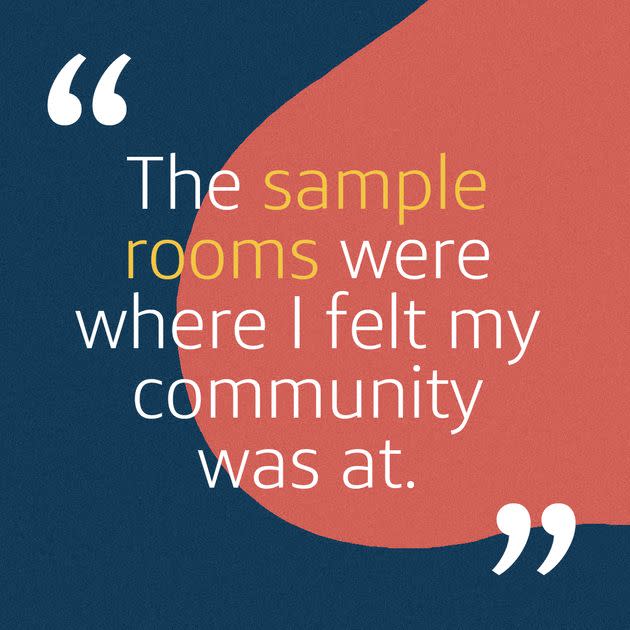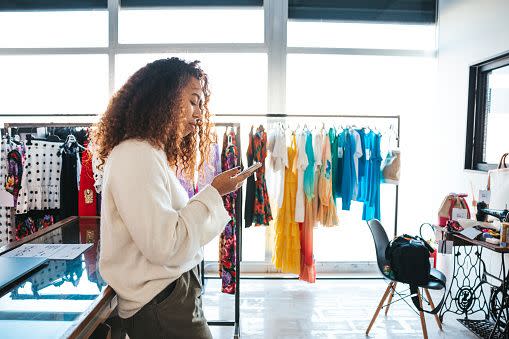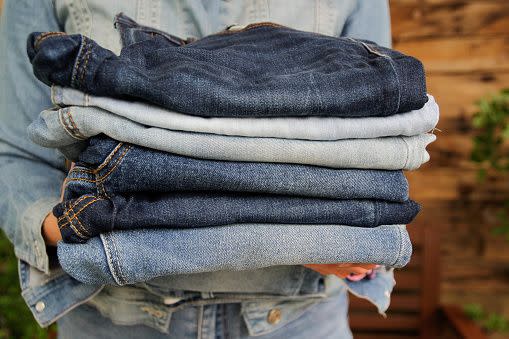These Two Latina Entrepreneurs Are Making Fashion More Sustainable

Wantclothingthat’s trendy and affordable? It’s going to cost the environment. According to Earth.org, fast fashion — which is the process of creating cheap, quickly made clothing based on trends and celebrity culture — is responsible for nearly 10% of global carbon emissions. Even worse, these fibers take a long time to decay in landfills and contribute to the estimated 92 million tons of textile waste that’s produced annually.
This is why two Latina fashion entrepreneurs — Cindy Castro and Dani Rodriguez — are trying to take a more ethical approach to fashion. Their goal: to make clothing that lasts longer, fairly treat the people who bring their designs to life and create products their customers can be proud of.

Cindy Castro: Luxury Meets Community
Originally from Ecuador, Cindy Castro came to the United States to pursue
her lifetime dream of becoming a fashion designer. She started from scratch in
fashion school and, without previous design training, graduated with honors
and proved to have an innate talent. As she grew up, fashion was what
helped her transform insecurities into confidence and that’s what also drives her to extend body positivity to others. Her career choice gave her insight into sample rooms (factory rooms dedicated to making samples), where she met immigrant sewers from Latin America.
“The sample rooms were where I felt my community was at,” said Castro. “They were immigrants like myself and our culture, warmth and language brought us together. Meanwhile I’m a Latina designer and no one looked like me outside those rooms. Those sewers became my community and when the pandemic happened, I found my purpose and knew I could give back by
providing them with jobs.”
After nine years of working in the fashion industry at big brands, Castro founded her own company for modern women who want to embrace their curves and create change: Cindy Castro New York. This contemporary luxury brand focuses on slow and sustainable fashion that also seeks to empower women and communities while creating timeless pieces.

Woman working as salesperson in a retail clothing store.
“My customer is someone who’s not only buying with her eye but also seeing clothing from a human perspective,” said Castro. “I always wonder who
makes my clothing and my mission is to be able to share a transparent
journey of the materials and practices from development to production. From
sourcing our certified eco-friendly fabrics — mostly silks, linens and organic
cotton so they don’t end up in landfills — to the people who make them (sewers, patternmakers, photographers, models and artisans) to our ecological
packaging.”
Early in the COVID-19 pandemic, Castro traveled to Colombia and Mexico to make sure the working conditions were safe and provided equal pay. And in 2022, Castro opened her own atelier in New York City’s Garment District, where half of her clothing is made by Latino immigrants.
“As an immigrant myself, it’s important for me to give back to the community,” said Castro. “When I talk about providing safer jobs, it goes beyond providing a safe environment. It’s also making sure the sewers in the sample rooms have the ability to go see a doctor or attend their child’s event.”
Dani Rodriguez: Jeans Made For You
With a voice and opera foundation as well as a business consulting background, Latina fashion entrepreneur Dani Rodriguez’s journey into sustainable fashion has been anything but linear. But her desire to find a pair of jeans that fit her body type made her want to start a business rooted in sustainability. So she co-founded her company, Neems, which sells custom jeans made from deadstock denim to prevent unnecessary textile waste.

Person holding a stack of folded denim jeans.
Neems was soft launched in March 2020 during the start of the COVID-19 pandemic, while everyone was locked down at home. This gave Rodriguez time to test products and find out what customers wanted in a pair of jeans — and one of those things was a perfect fit for their unique bodies.
“The denim industry is notorious for using fit models with bodies that are representative of less than 10% of the population,” said Rodriguez. “Apple-shaped bodies, larger bodies, pear-shaped bodies, among many other body types are so underserved in the denim industry. I want our jeans to give folks of all shapes and sizes the confidence they rightfully deserve.”
In an industry that is often size exclusive, Rodriguez is proud to make her
brand size inclusive, as Neems has no size limits. Each pair of jeans is custom made for each purchaser to ensure a perfect fit.
Capital One And #WeAllGrow
Castro and Rodriguez are just two of the Latina entrepreneurs who were featured at this year’s #WeAllGrow Latina Makers Market in partnership with Capital One. The #WeAllGrow summit highlighted and offered Latina founders the opportunity to vend and showcase their products to summit attendees. In addition to sponsoring the market, Capital One Business hosted a pitch competition wherein Latina entrepreneurs were invited to share their business pitches on video for a chance to win one of three grants.
Capital One believes in celebrating diversity and amplifying the achievements, triumphs and contributions of underrepresented communities, including Latino and Hispanic communities. You can learn more about how Capital One recognizes and supports these communities here.
This article was paid for by Capital One and created by HuffPost’s Branded Creative Team. HuffPost editorial staff did not participate in the creation of this content.

 Yahoo Movies
Yahoo Movies 